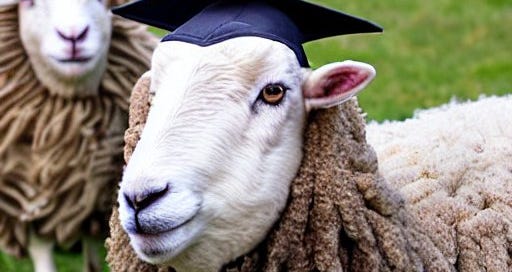(image made with Stable Diffusion)
Do successful people try to pass their money/status/privilege to their kids? Do they, in a sense, hoard their success? Obviously. It would be a more fair world otherwise, but trying to preserve and pass along wealth is merely human. Hoarding success doesn’t make you a bad person, but failing to appreciate that this is what you’re doing leaves you morally blind to all kinds of things.
Blind, for example, to how little you are actually willing to do to even the playing field. If your social justice jones is satisfied by a) buying a book on anti-racism and b) biting your tongue in the face of how wacky your kid’s curriculum is getting, you’re not doing nothing. You’re doing less than nothing — because those things are just empty distraction anyway.
Yascha Mounk is a smart center-left poli sci professor who leads Persuasion, a fantastic source of articles and podcasts. I was pleased to hear his most recent guest, William Deresiewicz (author of Excellent Sheep), skewer the performative hypocrisy of America’s elite in the most recent Persuasion podcast.
What hypocrisy? The hypocrisy that watered a million BLM® and In This House We Believe signs that bloomed all over the lawns of mostly-liberal enclaves like mine. The hypocrisy that is a walla of social justice platitudes, drowned out by the sonic backdrop of grinding economic misery. Such hopelessness these elites won’t touch. Not in policy, not in their persons, not with a ten block boathook.
But wait… aren’t I one of these elites? Pretty much: I grew up with privilege, I went to an Ivy, my kids go to private school, etc. But as an urban public school teacher for the last 15 years, I work with kids and families who have little to no prospects — and by prospects I mean, in many cases, even the dimmest view of the opportunities that could await them as they did me, if only… if only they had money, or stability, or hope, or health, or a dad, or any functional parent at all.
And I may be one of those elites but I’m vocally skeptical of that same pious and pusillanimous hypocrisy in ways that don’t always endear me to the bien pensant.
But back to Deresiewicz. He nails it. Happily, Persuasion provides a transcript of its podcasts, so I can excerpt some tasty bits here for anyone without the time to listen to the whole thing. (Even though you should.)
Deresiewicz:
We now have this liberal elite that still likes to think of itself as a kind of insurgency and therefore has a kind of a need to disavow its own power and position. At the same time, and this is a related development in some ways, we've had since about the ‘60s what we call the “meritocracy,” where the elite is chosen now not through heredity, but a broader, multi-ethnic, multi-gender elite that is supposedly—and, to a certain extent, is—selected through meritocratic means, through the same Ivy League institutions, but in a way that's become self-perpetuating.
… this elite thinks of itself as more democratic than ever because of meritocratic selection. And yet, as you say, it’s comically cut off from the society around it. And I think much of the the elite failure that we've seen now for several decades (I might point to the Hillary Clinton campaign as exemplary) has come from the fact that this liberal elite that speaks in the name of the oppressed, the downtrodden, the workers and the marginalized doesn't seem to have any idea what most people in the country experience, want, and think—and by most people, I don't mean the white working class that votes for Trump. I mean those that are theoretically their own constituents.
Deresiewicz captures the confusion of knowing you’re just lucky / yet your good fortune is due to hard work and talent / yet somehow neither is true / so both are.1 And, to me, he captures how a complacent and disengaged elite permits good intentions to be spent on bad ideas.
Sam Harris would interject that brilliant talent and a heroic work ethic are also, in the end, just dumb luck.





Not a knock on your efforts at teaching in the public school system (especially because you happen to be in a district where there's "actual" diversity and all the attendant challenges), but Public Schooling is no more equitable than the parallel system of Private schools. Private schools in our area only thrive because we have high-income parents and middling performing public schools.
Take a look at the state-wide public school rankings and the reality of just HOW inequitable the public educational system becomes glaringly obvious: the richest and "whitest" districts are in a whole other galaxy compared to the more racially and economically diverse cities or towns. And even the middling districts are themselves in a whole different world than the very poorest. In fact, the strongest competition for students in Private schools actually comes not from other independent schools, but wealthy public school districts. This doesn't even take into account the multiplying effects of wealthy parents volunteering their time in their kids schools...
It's strange that we understand highways, utilities, and so much more are shared as a public good, but public education is essentially reserved as a family asset. And full-disclosure: our family did Private through 6th grade. But that doesn't mean I think it "should" be that way.